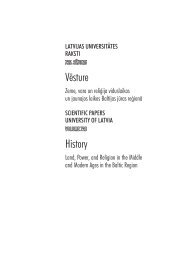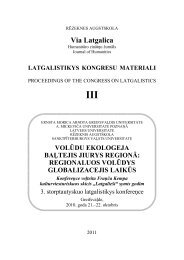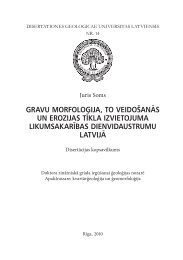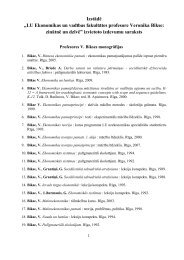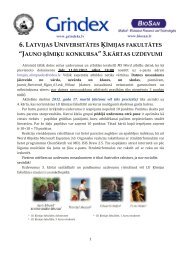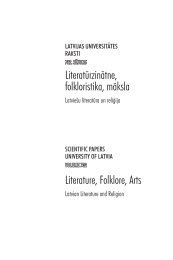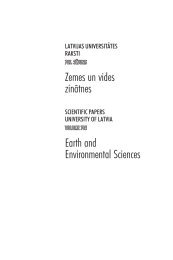Untitled
Untitled
Untitled
You also want an ePaper? Increase the reach of your titles
YUMPU automatically turns print PDFs into web optimized ePapers that Google loves.
Alex Taube. Pârdomas par apgaismîbas laikmeta nozîmi postmodernajâ daiïliteratûrâ: Pîtera ..<br />
207<br />
and miracles are explained away. The supernatural is rejected. There is no place for<br />
mystery in the mechanistic world vision of the enlightened thinkers of the Royal society<br />
because they view the world as consisting solely of material particles in motion.<br />
The spiritual vacuum is filled by the demonic cults and mystical teachings.<br />
The plague and the fire were for Dyer what the earthquake in Lisbon would be<br />
for the philosophers in 1755. The earthquake in Lisbon dashed the most cherished<br />
hopes of the Enlightenment. It shook the belief of the philosophers in an ordered,<br />
predictable world and in a benign rational God. Voltaire said: “After all, the world<br />
does contain evil” 6 . The rationalistic thinkers say that the devil is dead – they deny<br />
the wickedness and corruption of the world. Dyer rejects the mechanistic scientific<br />
philosophy of the Royal Society because it takes a very narrow view of human nature,<br />
seeing man as a rational being and ignoring man’s irrational impulses and desires.<br />
It views humanity as progressive and believes in man’s perfectibility. Rationalist<br />
philosophers emphasize the orderly and harmonious nature of the world functioning<br />
according to the principles of Newton’s mechanics. Dyer, on the contrary, has a<br />
very gloomy and pessimistic view of human nature and of the world. Having experienced<br />
the plague and the Great Fire of London, he finds it impossible to believe in<br />
the existence of order and harmony in the world or in man’s reasonableness and perfectibility.<br />
He speaks about “the Barbarities of Mankind” and of “the weaknesse and<br />
folly of Humane life” 7 , not of harmony or “Rationall Beauty” 8 . He “saw the true<br />
Face of the Great and Dreadfull God” 9 , and that was the face of Satan, not of the<br />
Christian god of love and compassion. For him human life is full of misery and despair,<br />
of pain and suffering. Human existence is wretched and miserable. He “saw<br />
that the intire World was one vast Bill of Mortality” 10 rather than an orderly and<br />
harmonious universe smoothly operating according to the mathematically expressed<br />
laws of physics. He thinks that “Daemons might walk through the Streets even as Men<br />
(on point of Death, many of them) debauch themselves” 11 . Men are like “the Flies on<br />
this Dunghil Earth” 12 . Dyer deplores the misery, wretchedness and corruption of the<br />
world “in this Rationall and mechanicall Age” 13<br />
Dyer does not believe in the power of the experimental philosophy to be of benefit<br />
to humanity as it ignores the actual state of affairs: “when the Cartesians and the<br />
New Philosophers speak of their Experiments, saying that they are serviceable to the<br />
Quiet and Peace of Man’s life, it is a great Lie: there has been no Quiet and there will<br />
be no Peace. The streets they walk in are ones in which Children die daily or are<br />
hang’d for stealing Sixpence; they wish to lay a solid Groundwork (or so they call it)<br />
for their vast Pile of Experiments, but the Ground is filled with Corses, rotten and<br />
rotting others” 14 . The project of the new philosophers is doomed to failure precisely<br />
because they want to base it upon the imperfect and flawed human nature.<br />
Likewise, Dyer doubts the capacity of reason to penetrate the mystery of human<br />
nature and to uncover all its secrets. He thinks that the glorification and privileging<br />
of reason over intuition, emotion, imagination, spirit and revelation is unjustified.<br />
When Wren and Dyer visit Bedlam, Dyer asks “What little Purpose have we to glory<br />
in our Reason when the Brain may so suddenly be disorder’d?” 15 For Dyer the light<br />
of reason does not illuminate the world, which is full of uncertainties and hazards. It<br />
is the world of shadows rather than light: “This mundus tenebrosus, this shaddowy



